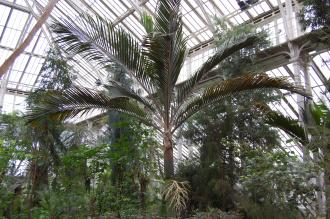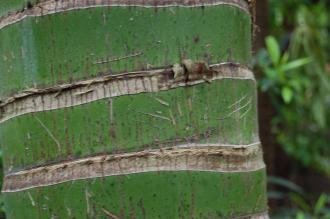
Rhopalostylis baueri (09/02/2013, Kew Gardens, London)
Position: Full sun to light shade
Flowering period: Summer
Soil: Moist, well drained
Eventual Height: 12m
Eventual Spread: 5m
Hardiness: 9b – 11
Family: Arecaceae
Rhopalostylis baueri is an evergreen palm tree with a single stem. Its dark green leaves are pinnate and up to 3.5m long. Its leaflets are up to 1m long and 4cm broad. Its trunk may achieve a diameter of up to 35cm. Its ‘bark’ is green and fades to gray with age. Its flowers appear on a raceme that is up to 30cm long. Its fruit are spherical, up to 13mm across, appear green becoming red as the fruit ripen.
Rhopalostylis baueri , commonly known as the Norfolk Island Palm or Niau, is native to Norfolk Island, Australia and Kermadec Islands, New Zealand. In its native habitat it grows in both dry and wet forests. The native population on Norfolk Island is threatened by rats who eat its seedlings and fruit.
The etymological root of the binomial name Rhopalostylis is derived from the Greek ropalon meaning ‘club’ and stylis meaning ‘the styles of a flower’. Baueri is named after Ferdinand Lucas Bauer (1760 – 1826), an Australian botanical illustrator.
The landscape architect may find Rhopalostylis baueri useful as a palm for planting in avenues, rows or as a specimen. It is a palm that does not require a hot, humid climate.
Ecologically, Rhopalostylis baueri fruit are attractive to some birds and mammals.

Rhopalostylis baueri Bark (09/02/2013, Kew Gardens, London)
Rhopalostylis baueri prefers moist, fertile, well-drained soils. It tolerates most pH of soil.
Rhopalostylis baueri requires little maintenance.

